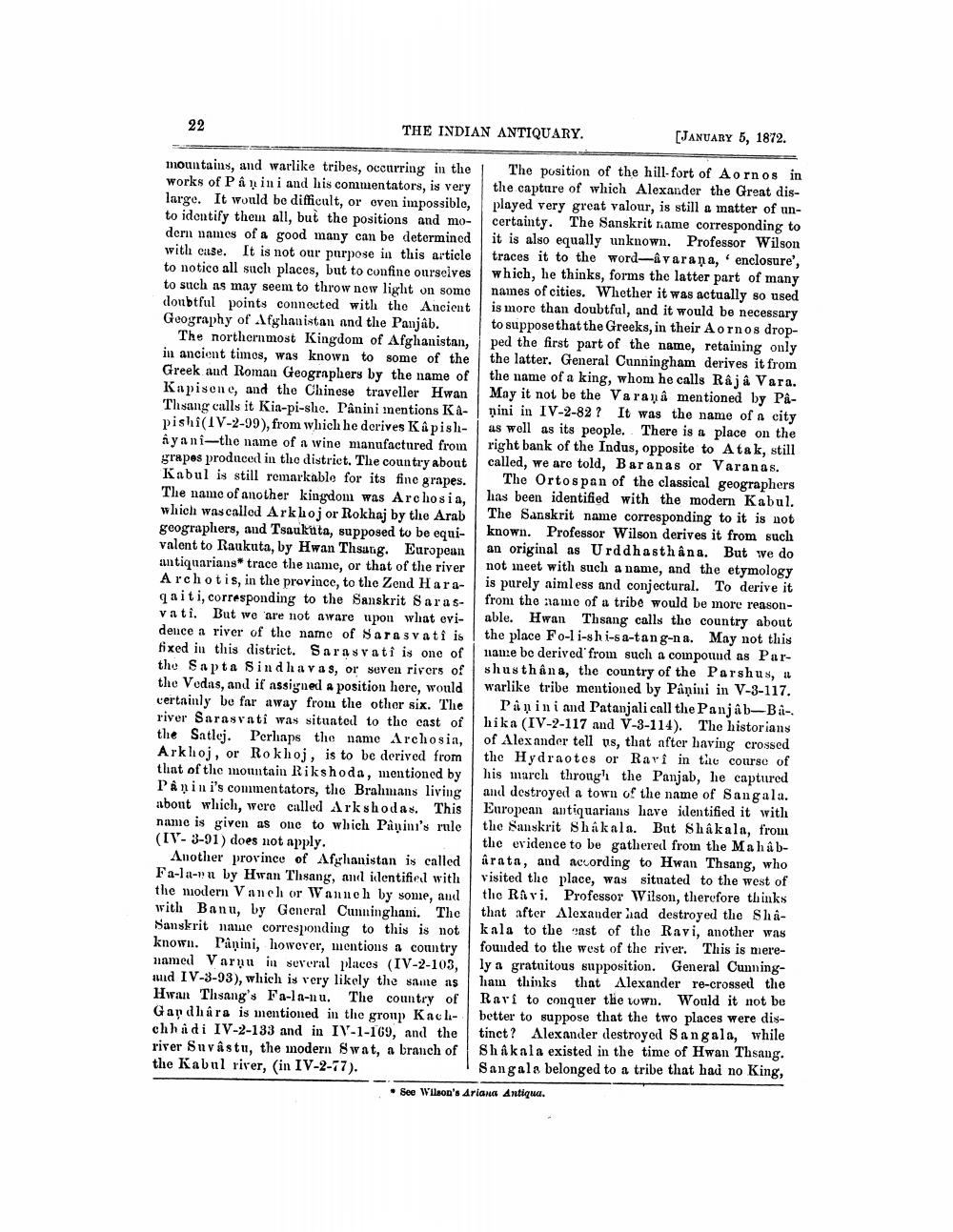________________
22
THE INDIAN ANTIQUARY.
[JANUARY 5, 1872.
mountains, and warlike tribes, occurring in the The position of the hill-fort of Aornos in works of Panini and his commentators, is very the capture of which Alexander the Great dislarge. It would be difficult, or even impossible, played very great valour, is still a matter of unto identify them all, but the positions and mo- certainty. The Sanskrit name corresponding to dern names of a good many can be determined it is also equally unknown. Professor Wilson with cise. It is not our purpose in this article traces it to the word-avarana, enclosure', to notico all such places, but to confine ourselves which, he thinks, forms the latter part of many to such as may seem to throw now light on some names of cities. Whether it was actually so used doubtful points connected with the Ancient is more than doubtful, and it would be necessary Geography of Afghanistan and the Panjab. to suppose that the Greeks, in their Aornos drop
The northernmost Kingdom of Afghanistan, ped the first part of the name, retaining only in ancient timos, was known to some of the the latter. General Cunningham derives it from Greek and Roman Geographers by the name of the name of a king, whom he calls Raja Vara. Kapisone, and the Chinese traveller Hwan May it not be the Varanâ mentioned by PåThsang calls it Kia-pi-she. Panini mentions Kamini in IV-2-82? It was the name of a city pishi(IV-2-99), from which he derives Kapish- as well as its people. There is a place on the â yani-the name of a wine manufactured from right bank of the Indus, opposite to Atak, still grapes produced in the district. The country about called, we are told, Baranas or Varanas. Kabul is still remarkable for its fine grapes. The Ortospan of the classical geographers The name of another kingdom was Arelosia,
has been identified with the modern Kabul. which was called Arklojor Rokhaj by the Arab The Sanskrit name corresponding to it is not geographers, and Tsaukuta, supposed to be equi- known. Professor Wilson derives it from such valent to Raukuta, by Hwan Thsung. European an original as Urddhasthana. But we do antiquarians trace the name, or that of the river not ineet with such a name, and the etymology Archotis, in the province, to the Zend Hara- is purely aimless and conjectural. To derive it qaiti, corresponding to the Sanskrit Saras- from the name of a tribe would be more reasonvati. But we are not aware upon what ovi- able. Hwan Thsang calls the country about dence a river of the name of Sarasvati is the place Fo-li-shi-sa-tang-na. May not this fixed in this district. Sarasvati is one of name be derived from such a compouud as Parthe Sapta Sindha vas, or seven rivers of shusthana, the country of the Parshus, il the Vodas, and if nssigned a position here, would warlike tribe mentioned by Panini in V-3-117. certainly be far away from the other six. The Piņini and Patanjali call the Panjab-Biriver Sarasvati was situnted to the cast of hika (IV-2-117 and V-3-114). The historians the Satlej. Perhaps the name Archosin, of Alexander tell us, that after having crossed Arkhoj, or Rokhoj, is to be derived from the Hydraotes or Ravi in the course of thint of the mountain Rikshoda, mentioned by his march throug'i the Panjab, he captured Pånini's commentators, the Brahmans living and destroyed a town of the name of Sangala. abont which, were called Arkshodas. This European antiquarians have identified it with name is given as one to which Půņini's rule the Sanskrit Shakala. But Shakala, from (IV- 3-91) does not apply.
the evidence to be gathered from the MahâbAnother province of Afghanistan is called arata, and according to Hwan Thsang, who Fa-la-nu by Hwan Thsang, and identified with visited the place, was situated to the west of the modern V anchor Wannch by some, and the Rari. Professor Wilson, therefore thinks with Banu, by General Cunningham. The that after Alexander had destroyed the ShaSanskrit name corresponding to this is notkala to the east of the Ravi, another was known. Panini, however, mentions a country
founded to the west of the river. This is merenamed Varņu in several places (IV-2-103, ly a gratuitous supposition. General Cunningaud IV-3-93), which is very likely the same as ham thinks that Alexander re-crossed the Hwan Thsang's Fa-la-n u. The country of Ravi to conquer the town. Would it not be Gap dhára is mentioned in the group Kacli- better to suppose that the two places were dischhadi IV-2-133 and in IV-1-169, and the tinct? Alexander destroyed Sangala, while river Suvâstu, the modern Swat, a branch of Shaknla existed in the time of Hwan Thsang. the Kabul river, (in IV-2-77).
Sangala belonged to a tribe that hau no King, See Wilson's Ariana Antiqua.




